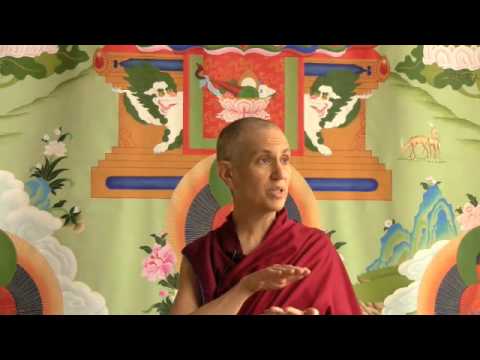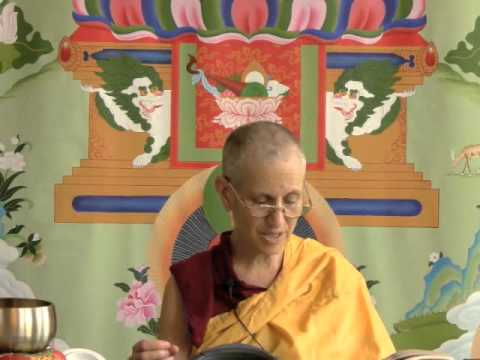Mind and limitless good qualities
Stages of the Path #114: The Third Noble Truth
Part of a series of Bodhisattva's Breakfast Corner talks on the Stages of the Path (or Lamrim) as described in the Guru Puja text by Panchen Lama I Lobsang Chokyi Gyaltsen.
- How the good qualities can be developed endlessly
- The mind is a stable basis
- The mind can be habituated to good qualities
- Virtuous qualities can never be harmed by reasoning
- The importance of thinking deeply about these teachings
We’ve been talking about how it is possible to eliminate the afflictions. In other words, how the third of the four noble truths (true cessation) is possible to actualize.
When we’re talking about the mind, we were talking before about how the afflictions can be purified from it, and now we want to talk a little bit about how the good qualities can be developed limitlessly, or endlessly.
His Holiness talked about three qualities of the mind that enable the good qualities to be produced limitlessly:
-
First is that the mind is a very stable basis, it doesn’t come and go. It’s always there. It’s not a soul, it’s not permanent, it’s changing moment by moment, but it has a continuity that doesn’t end. Therefore it’s a stable basis on which we can develop good qualities.
The analogy for the first quality, that the mind is stable. Here His Holiness was saying it’s not like water which evaporates and then the clouds rain and you get more water, and it evaporates. But rather that the mind is steady.
-
The second is that the mind can be habituated to good qualities, and we can develop those good qualities. And as we develop them we can build on the good qualities we’ve developed before. In other words, each time we develop them we don’t have to start all over at the ground floor and go up. If we’ve developed something this far we can start here and go up. He compares it to a high jumper, whenever a high jumper raises the bar he still has to go up the same distance he jumped before plus the extra little bit. But here when we’re building on good qualities (especially within one lifetime because they can be diminished from one lifetime to the next) is that we can build consecutively, we don’t always have to start on the bottom.
So, the mind’s stability, The second: the qualities can be developed based on what you’ve developed before, you don’t have to start all over again.
-
Third is that the virtuous, or constructive, qualities can never be harmed by reasoning. They can never be harmed by wisdom. We were talking before, this is a big difference between the afflictions and the virtuous qualities, because once you refute the object grasped at by ignorance then the afflictions can’t stand up. Whereas even you refute the objects that ignorance grasps at the virtuous qualities can still exist.
These three things mean that the good qualities can be developed endlessly. When we realize that the afflictions can be eliminated and the good qualities developed endlessly then we get a feeling that it’s completely possible to attain liberation and nirvana.
It’s really important to think about these different things that we’ve been covering the last few days about true cessation, to really think about them in depth and gain some conviction in them. If we just hear the talk but we don’t think about it there’s still going to be a lot of doubt in our minds. But if we really think about these things and ponder them then that serves to eliminate the doubt.
Audience: Just with the fact that our good qualities can decline from life to life, besides dedication are there other ways that we can practice to really ensure that they continue to grow from life to life?
Venerable Thubten Chodron: Besides dedication what way can we ensure our good qualities to grow from life to life. Well, I would say one is cultivate them very strongly in this life, because things that are cultivated strongly it’s harder for them to fade away.
Then the dedication.
The rejoicing, I think, is also important. That we rejoice in our own virtue as well as other people’s virtues.
That we practice so that at the time of death we will have a virtuous mind, because if we have a virtuous mind then that helps previously create good karma to ripen. When that ripens then we get a good rebirth where we have good conditions to practice Dharma. And those good conditions, the good environmental conditions, will encourage the seeds of the good qualities we developed in a previous life to manifest. Whereas if we get born in a bad rebirth the environment can completely squash those seeds.
That’s why we dedicate for full enlightenment, but we also, as a byproduct of that, want a good rebirth so that we can continue practicing.
Venerable Thubten Chodron
Venerable Chodron emphasizes the practical application of Buddha’s teachings in our daily lives and is especially skilled at explaining them in ways easily understood and practiced by Westerners. She is well known for her warm, humorous, and lucid teachings. She was ordained as a Buddhist nun in 1977 by Kyabje Ling Rinpoche in Dharamsala, India, and in 1986 she received bhikshuni (full) ordination in Taiwan. Read her full bio.


